How Mediterranean is Your Diet? Take this 2-minute quiz and find out.
New study shows exactly how eating this way protects the brain
If your diet leans towards the Mediterranean or MIND guidelines, there’s good news for your brain. New data out of Rush University, published this week in the journal Neurology, is the first to show that eating this way reduces Alzheimer’s pathology in the brain. So while I was planning on sharing my new quiz with you today—How Mediterranean is Your Diet?—let’s also take a look at this exciting new study.
Last time, We talked about the Mediterranean diet along with similar traditional dietary patterns from Africa, Asia, and Latin America. The Medi diet’s staying power stems from the fact that besides being easy to follow and full of interesting, delicious foods, it’s not a diet at all. It’s a lifestyle—a pattern of eating and drinking in concert with physical activity and socialization. The MIND diet, as you may recall, is a brain-focused spin-off of the Mediterranean diet. (I’ve wrote about the MIND diet’s 10 brain-healthy food groups, and about the 5 food groups to avoid.) Both of these diets have the most scientific data behind them to show that they improve cognitive function now, while reducing the risk of Alzheimer’s and other dementias later.
This week’s study from Rush gives us new information about the impact of certain food groups in Alzheimer's pathology. It is the first to actually compare the brains (via post-mortem examination) of Mediterranean vs. MIND diet eaters. Researchers evaluated 14 food groups to see which ones increased or decreased the classic signs of Alzheimer’s—beta-amyloid plaque and neurofibrillary tau tangles. They also compared differences between womens’ and mens’ brains, and those who carry the ApOE4 Alzheimer’s risk gene.
Just like the original MIND diet study, this one followed study participants prospectively using detailed food questionnaires and serial cognitive tests. The data reflects how these people ate in the decade before they passed, omitting the last year of life when health issues may have impacted dietary choices.
These findings stand out:
Close adherence to the Mediterranean diet resulted in brains that looked 18 years younger at autopsy, while MIND diet guidelines yielded brains that looked 12 years younger.
The Mediterranean diet was found to be especially linked to reduced beta-amyloid in the brain. In fact, there was a remarkable inverse relationship between amyloid deposits and adherence to the diet. In other words, the more Medi the diet, the less plaque in the brain.
Fried and fast foods, sugar-laden foods, and processed pastries and sweets were more associated with tau tangles in the brain (aka neurofibrillary tangles). Researchers postulate that foods high in sugar and saturated fat impact the brain by increasing insulin resistance and inflammation.
People who follow either diet closely had almost 40% reduced risk of having either pathology—amyloid or tau.
Small changes in diet yield significant brain gains. Adding just one Mediterranean or MIND food group (such as leafy greens or vegetables) meant participants’ brains gained 4 years of longevity.
Leafy greens were noted as the most powerful food group to include in a brain-healthy diet. Berries and whole grains also scored high for reducing Alzheimer’s pathology.
Surprisingly, close adherence to the MIND diet did not have as strong an association with reducing amyloid in the brain. Researchers hypothesize that the MIND diet may reduce Alzheimer’s through other, non-amyloid pathways. This is exciting because it’s important to attack reducing Alzheimer’s from many different angles.
Women had less overall Alzheimer’s pathology if they ate more leafy greens and vegetables, and less processed meats. Men, on the other hand, fare better with higher fish intake and moderate poultry consumption. Men who drank more than 1 (5-ounce) serving of red wine had more tau in the brain.
The study’s number of ApoE4 (a risk gene for Alzheimer’s) carriers was too small to draw a statistically significant conclusion. They had less benefit from boosting leafy greens, beans and reducing fried/fast foods. Drinking wine increased amyloid burden in ApoE4 carriers, a finding that has been shown elsewhere.
Even though individual food groups were singled out in relation to Alzheimer’s pathology, the authors emphasize: “potential benefit of these dietary components relies on their consumption in combination as an overall healthy dietary pattern rather than the effect of a single food or food group that may directly impact AD pathology in human brains.” In other words, no one food group was as important as following an overall brain-healthy dietary pattern.
This study brings up fascinating questions about how men and women metabolize foods differently. And, how some foods influence the deposition of amyloid, while others impact tau. It sets the stage for further investigation of how one’s personal eating pattern impact’s Alzheimer’s pathology. While both the Mediterranean and MIND diets are clearly beneficial for brain health, it is interesting to tease out their unique advantages.
What do you think of these findings? Are there any that surprise you?
How to eat Mediterranean wherever you are
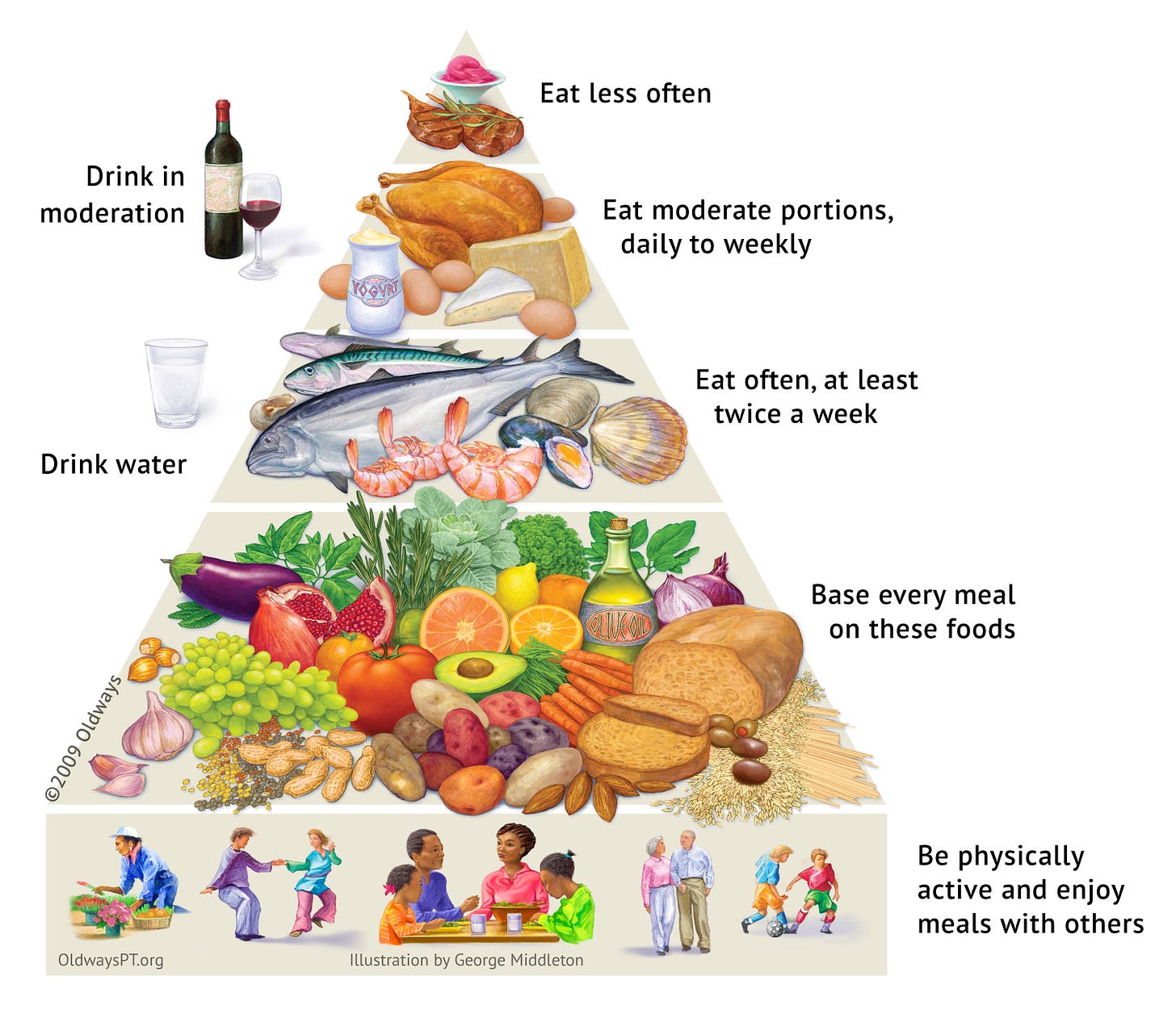
The Mediterranean style of eating may have roots in Greece and Italy, but you can adapt it to wherever you are. Studies have shown that you don’t have to live near the Mediterranean Sea to get the same benefits; it performs well outside of its native soil. With some strategic shopping skills, you can find plenty of Mediterranean foods at the grocery store. In the produce aisle, reach for bitter greens (Swiss chard, radicchio, arugula, and broccoli rabe), mushrooms (all types), and in-season citrus. Next to the white rice and pasta, look for whole-grain alternatives like farro, quinoa, and black rice. Stock up on olives (whole, unpitted are best), capers, and single-origin extra-virgin olive oil from California, Spain, Greece, or Italy.
The Mediterranean diet includes a more servings of fish and seafood (3 or more per week) than the MIND diet guidelines (1 or more per week). At the seafood counter, choose wild-caught salmon and cod, American shrimp when in season, and farmed mussels year round. Bonus if your grocery store offers fresh oysters—they can be an affordable splurge packed with brain health nutrients. Find good-quality anchovies and sardines in tins where you’d find the canned tuna; and if you want tuna, look for it packed in olive oil.
In my book, I modified the MIND diet guidelines to be more like a plant-rich Mediterranean diet with additional servings of leafy greens and vegetables, and fewer servings of animal products.
How Mediterranean is your diet?
For a quick snapshot of how Mediterranean your diet is, I’ve put together this 2-minute quiz. My scale is based on the rating systems used in the Mediterranean diet studies to evaluate participants.
What you eat really does change the brain
Each new study about the impact of nutrition on the brain adds a piece to the puzzle of how to protect cognitive health. And while the studies may point out small differences in these brain-protective dietary patterns, it’s important to keep the big picture in mind. In study after study, close adherence to a Mediterranean-style diet (including the MIND diet) translates to heightened protection from brain diseases.
Book Tour Update
I returned home yesterday from Dallas after a busy week of Brain Health Kitchen book tour events. Everywhere I spoke, people were excited about the book! I loved seeing everyone’s unique spin on the recipes, especially these dishes transformed into fancy brain bites.


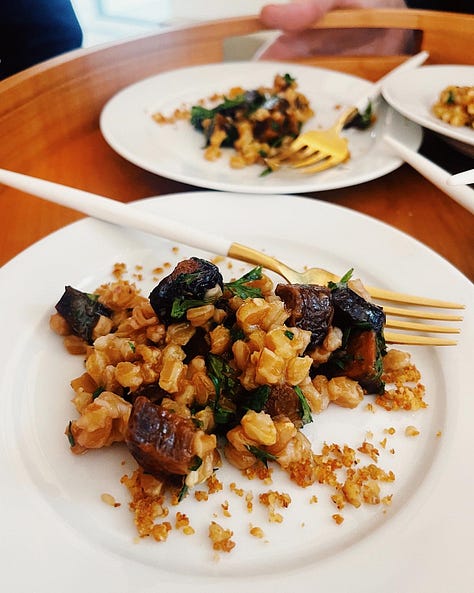


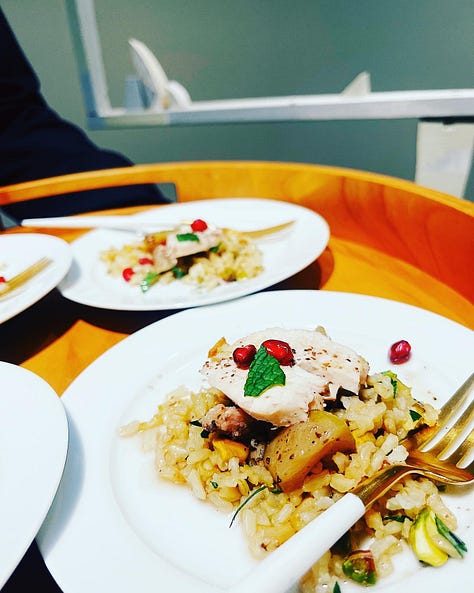
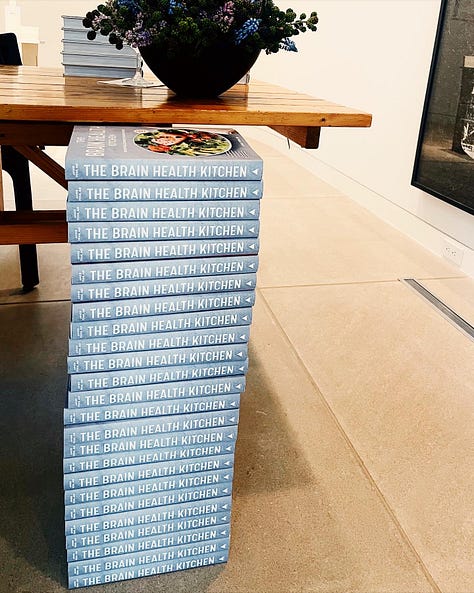


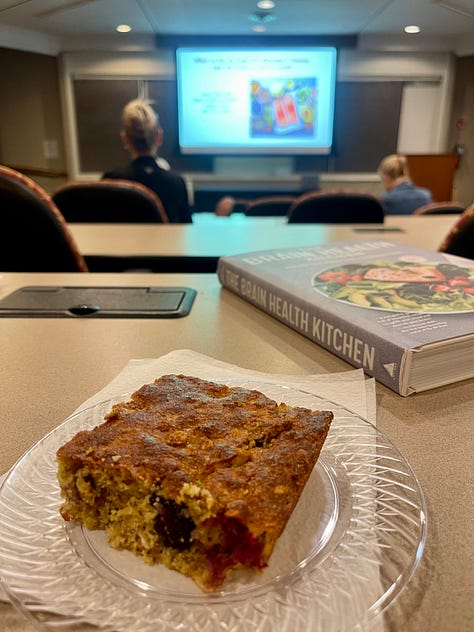

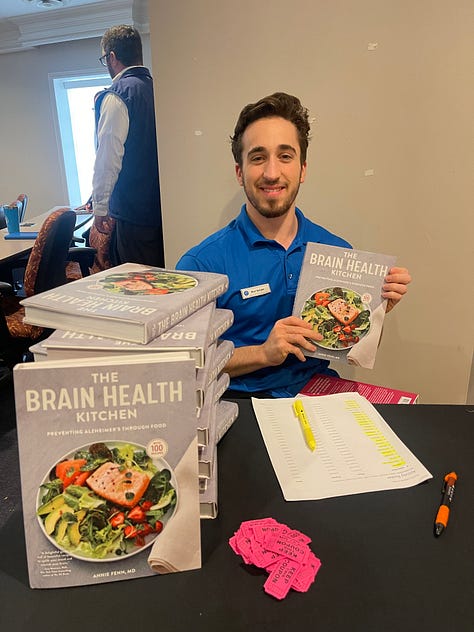



After heading south for our Panama Brain Health Retreat, I’ll be back on book tour in Denver and Boulder, Colorado. Later in April, I’ll be in Cincinnati, New York City, and Boston. It’s been an incredible joy for me to meet brain health ambassadors like you out in the real world. As always, you will find all book tour information and updates HERE.
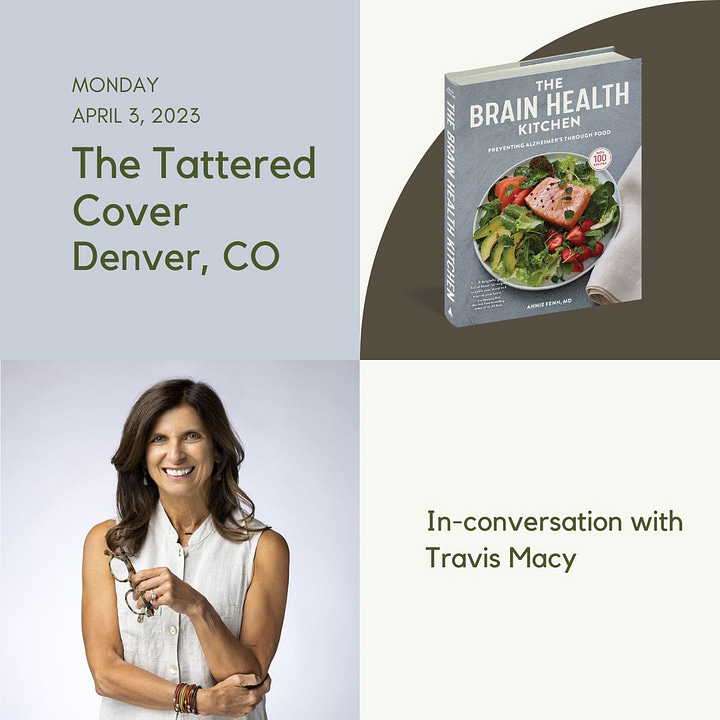
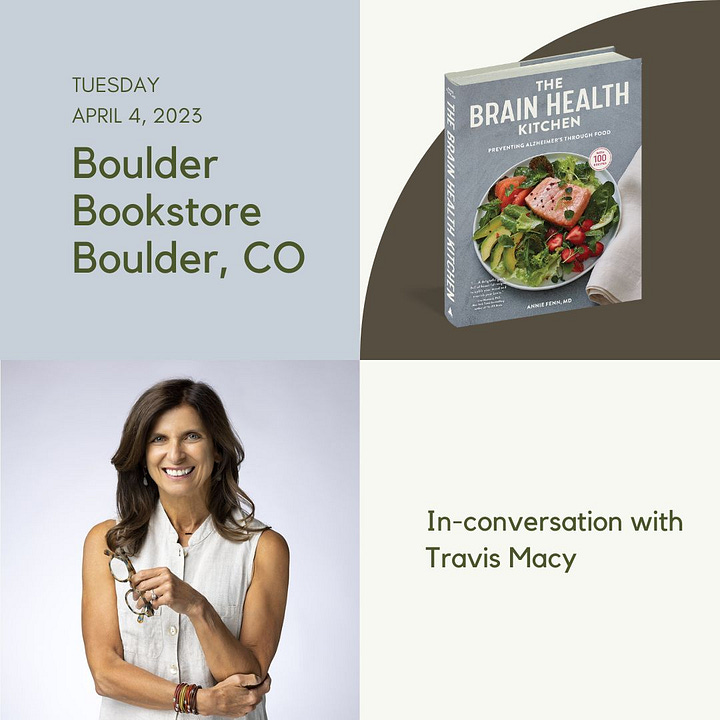
How did you do on the Medi Lifestyle Quiz? I would love to know. I’ll be back next week to give you some Brain Health Homework. Until then, have a wonderful weekend, friends.
Love,
Annie

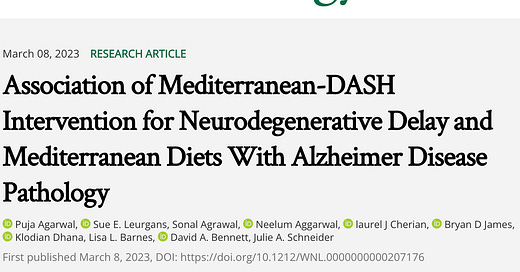





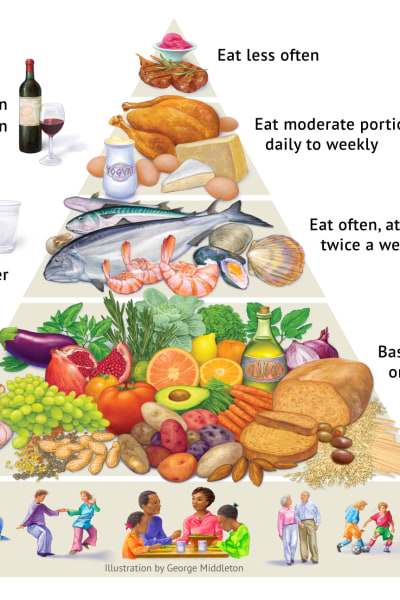
10 points, wondering about poultry, I eat that 4 times a week.
Gluten Free makes healthy whole grains harder, I try to find things with fiber exceeding 10% of carbs.
No red meat, no dairy except tiny amounts of cheese, no alcohol.
Olives - what a great treat! I should do more...
Morning Annie, I scored high on the test but did know and implement most of the suggestions. I am going to send to many of my friends - thankful to have this information in print from someone I admire and trust.
Another suggestion for conversation email thread would be podcasts - I often have a problem finding these and would love recommendations - thanks so much karen